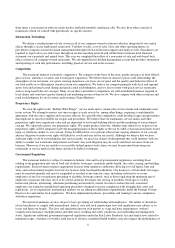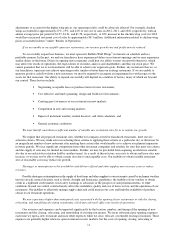Buffalo Wild Wings 2012 Annual Report Download - page 15
Download and view the complete annual report
Please find page 15 of the 2012 Buffalo Wild Wings annual report below. You can navigate through the pages in the report by either clicking on the pages listed below, or by using the keyword search tool below to find specific information within the annual report.15
and hourly Team Members. The inability to recruit, develop and retain these individuals may delay the planned openings of
new restaurants or result in high employee turnover in existing restaurants, thus increasing the cost to efficiently operate our
restaurants. This could inhibit our expansion plans and business performance and, to the extent that a labor shortage may
force us to pay higher wages, harm our profitability. The loss of any of our executive officers could jeopardize our ability to
meet our financial targets.
We may not be able to obtain and maintain licenses and permits necessary to operate our restaurants.
The restaurant industry is subject to various federal, state, and local government regulations, including those relating to
the sale of food and alcoholic beverages. In addition, we are subject to gaming regulations with respect to our gaming
operations within our nine company-owned restaurants in Las Vegas. The failure to obtain and maintain these licenses,
permits and approvals, including food, liquor and gaming licenses, could adversely affect our operating results. Difficulties or
failure to obtain the required licenses and approvals could delay or result in our decision to cancel the opening of new
restaurants. Local authorities may revoke, suspend, or deny renewal of our food and liquor licenses if they determine that our
conduct violates applicable regulations.
Unfavorable publicity could harm our business.
Multi-unit restaurant businesses such as ours can be adversely affected by publicity resulting from complaints or
litigation or general publicity regarding poor food quality, food-borne illness, personal injury, food tampering, adverse health
effects of consumption of various food products or high-calorie foods (including obesity), or other concerns. Negative
publicity from traditional media or on-line social network postings may also result from actual or alleged incidents or events
taking place in our restaurants. Regardless of whether the allegations or complaints are valid, unfavorable publicity
relating to a number of our restaurants, or only to a single restaurant, could adversely affect public perception of the entire
brand. Adverse publicity and its effect on overall consumer perceptions of food safety, or our failure to respond
effectively to adverse publicity, could have a material adverse effect on our business.
The sale of alcoholic beverages at our restaurants subjects us to additional regulations and potential liability.
Because our restaurants sell alcoholic beverages, we are required to comply with the alcohol licensing requirements of
the federal government, states and municipalities where our restaurants are located. Alcoholic beverage control regulations
require applications to state authorities and, in certain locations, county and municipal authorities for a license and permit to
sell alcoholic beverages on the premises and to provide service for extended hours and on Sundays. Typically, the licenses
are renewed annually and may be revoked or suspended for cause at any time. Alcoholic beverage control regulations relate
to numerous aspects of the daily operations of the restaurants, including minimum age of guests and employees, hours of
operation, advertising, wholesale purchasing, inventory control and handling, storage and dispensing of alcoholic beverages.
If we fail to comply with federal, state or local regulations, our licenses may be revoked and we may be forced to terminate
the sale of alcoholic beverages at one or more of our restaurants. Further, growing movements to change laws relating to
alcohol may result in a decline in alcohol consumption at our restaurants or increase the number of dram shop claims made
against us, either of which may negatively impact operations or result in the loss of liquor licenses.
In certain states we are subject to “dram shop” statutes, which generally allow a person injured by an intoxicated
person the right to recover damages from an establishment that wrongfully served alcoholic beverages to the intoxicated
person. Some dram shop litigation against restaurant companies has resulted in significant judgments, including punitive
damages.
Changes in employment laws or regulation could harm our performance.
Various federal and state labor laws govern our relationship with our employees and affect operating costs. These laws
include minimum wage requirements, overtime pay, healthcare reform and the implementation of the Patient Protection and
Affordable Care Act, unemployment tax rates, workers’ compensation rates, citizenship requirements, union membership,
and sales taxes. A number of factors could adversely affect our operating results, including additional government-imposed
increases in minimum wages, overtime pay, paid leaves of absence and mandated health benefits, mandated training for
employees, increased tax reporting and tax payment requirements for employees who receive tips, a reduction in the number
of states that allow tips to be credited toward minimum wage requirements, changing regulations from the National Labor
Relations Board and increased employee litigation including claims relating to the Fair Labor Standards Act.
The Americans with Disabilities Act is a federal law that prohibits discrimination on the basis of disability in public
accommodations and employment. Although our restaurants are designed to be accessible to the disabled, we could be
























